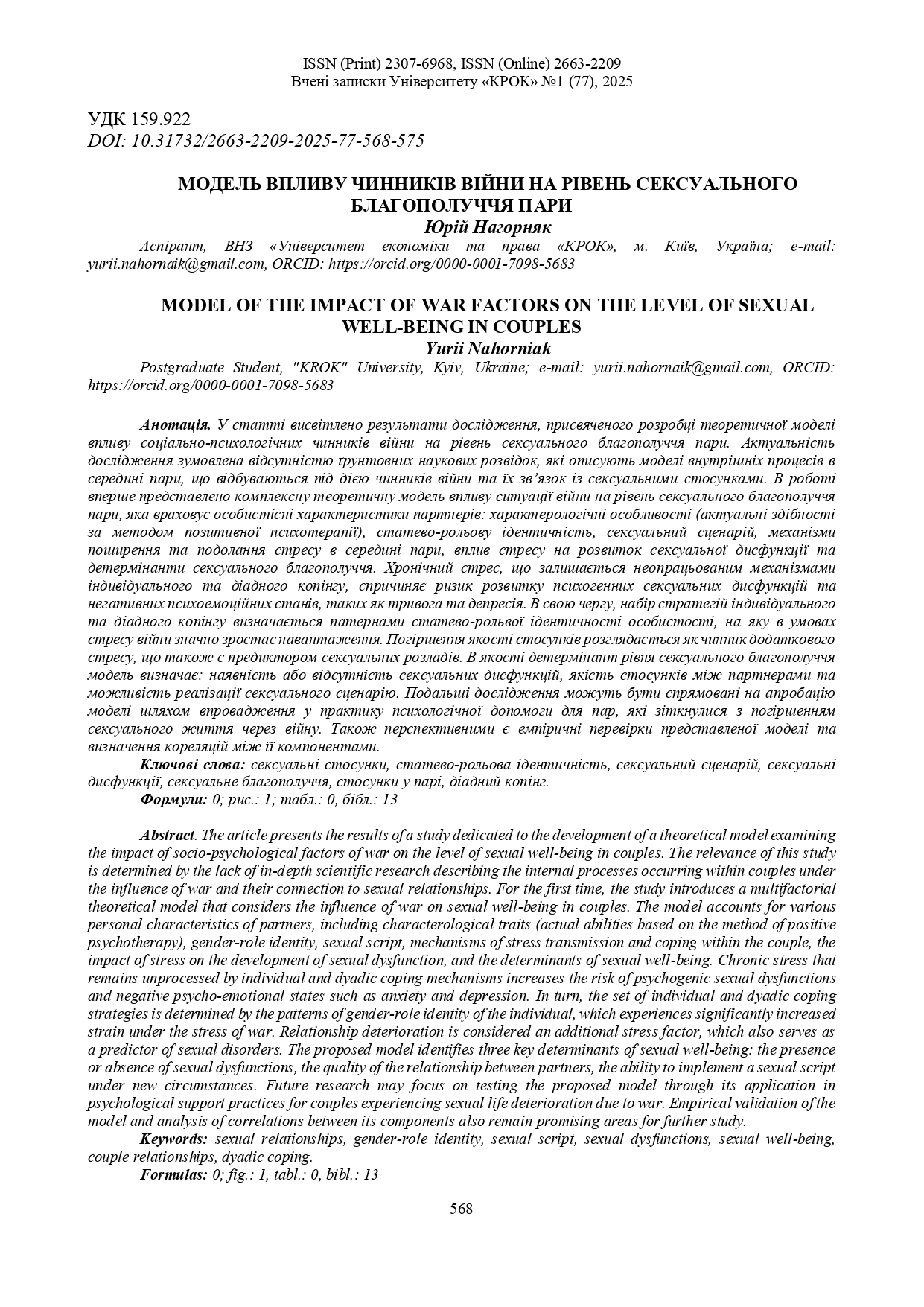МОДЕЛЬ ВПЛИВУ ЧИННИКІВ ВІЙНИ НА РІВЕНЬ СЕКСУАЛЬНОГО БЛАГОПОЛУЧЧЯ ПАРИ
DOI:
https://doi.org/10.31732/2663-2209-2025-77-568-575Ключові слова:
сексуальні стосунки, статево-рольова ідентичність, сексуальний сценарій, , сексуальні дисфункції, сексуальне благополуччя, стосунки у парі, діадний копінгАнотація
У статті висвітлено результати дослідження, присвяченого розробці теоретичної моделі впливу соціально-психологічних чинників війни на рівень сексуального благополуччя пари. Актуальність дослідження зумовлена відсутністю ґрунтовних наукових розвідок, які описують моделі внутрішніх процесів в середині пари, що відбуваються під дією чинників війни та їх зв’язок із сексуальними стосунками. В роботі вперше представлено комплексну теоретичну модель впливу ситуації війни на рівень сексуального благополуччя пари, яка враховує особистісні характеристики партнерів: характерологічні особливості (актуальні здібності за методом позитивної психотерапії), статево-рольову ідентичність, сексуальний сценарій, механізми поширення та подолання стресу в середині пари, вплив стресу на розвиток сексуальної дисфункції та детермінанти сексуального благополуччя. Хронічний стрес, що залишається неопрацьованим механізмами індивідуального та діадного копінгу, спричиняє ризик розвитку психогенних сексуальних дисфункцій та негативних психоемоційних станів, таких як тривога та депресія. В свою чергу, набір стратегій індивідуального та діадного копінгу визначається патернами статево-рольвої ідентичності особистості, на яку в умовах стресу війни значно зростає навантаження. Погіршення якості стосунків розглядається як чинник додаткового стресу, що також є предиктором сексуальних розладів. В якості детермінант рівня сексуального благополуччя модель визначає: наявність або відсутність сексуальних дисфункцій, якість стосунків між партнерами та можливість реалізації сексуального сценарію. Подальші дослідження можуть бути спрямовані на апробацію моделі шляхом впровадження у практику психологічної допомоги для пар, які зіткнулися з погіршенням сексуального життя через війну. Також перспективними є емпіричні перевірки представленої моделі та визначення кореляцій між її компонентами.
Завантаження
Посилання
Гупаловська, В. (2021). Суб’єктивне сексуальне благополуччя: концептуалізація поняття та психологічна модель. Psychological Journal, 7(9), 36-47.
Нагорняк, Ю. В. (2024). Гендерні особливості постстресових реакцій та інструменти позитивної психотерапії в подоланні стресу. Науковий вісник Ужгородського національного університету. Серія: Психологія, (3). https://doi.org/10.32782/psy-visnyk/2024.3.18
Нагорняк, Ю. В. (2024). Стресогенні фактори сексуальних дисфункцій та терапевтична стратегія їх подолання. Вчені записки Університету "КРОК", 2(74), 324-331. https://doi.org/10.31732/2663-2209-2024-74-337-344
Родіна, Н. В. (2015). Статево-рольова ідентичність особистості та особливості подолання стресу в ситуаціях загрози самоактуалізації. Освіта та розвиток обдарованої особистості, (1), 32.
Сингаївська, І. В., & Осауленко, Н. В. (2023). Особливості комунікативних проблем в шлюбних партнерських стосунках переселенців під час війни. Вчені записки Університету «КРОК», 3(71), 125-134.
Слюсар, Л. (2023). Українська сім’я в умовах війни. Demography and social economy, 52(2), 3-20.
Шинкаренко, І. (2022). Сім’я в умовах війни: психологічні, психосоціальні та психопатологічні проблеми. Науковий вісник Дніпровського державного університету внутрішніх справ, (2), 554-562.
Bodenmann, G., Ledermann, T., & Bradbury, T. N. (2007). Stress, sex, and satisfaction in marriage. Personal relationships, 14(4), 551-569.
Bodenmann, G., Randall, A. K., & Falconier, M. K. (2016). Coping in couples: the systemic transactional model (STM). In Couples coping with stress, 5-22. Routledge.
Lipińska-Grobelny, A. (2011). Effects of gender role on personal resources and coping with stress. International Journal of Occupational Medicine and Environmental Health, 24(1), 18–28. https://doi.org/10.2478/s13382-011-0002-6
Peseschkian, N. (1993). Psychosomatik und Positive Psychotherapie. Springer – Verlag Berlin Heidelberg.
Simon, W., & Gagnon, J. H. (2003). Sexual scripts: Origins, influences and changes. Qualitative Sociology, 26(4), 491–497. https://doi.org/10.1023/B:QUAS.0000005053.99846.e5
Shamai, M., Enosh, G., Machmali-Kievitz, R., & Gilad, D. (2017). Living in the line of fire: The impact of the exposure to warfare on couple relationships. Journal of Family Therapy, 39(3), 386–403. https://doi.org/10.1111/1467-6427.12162

Downloads
Опубліковано
Як цитувати
Номер
Розділ
Ліцензія

Ця робота ліцензується відповідно до Creative Commons Attribution-NonCommercial 4.0 International License.

